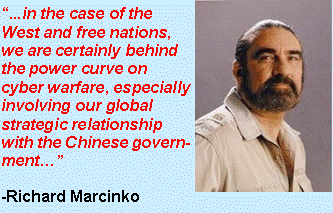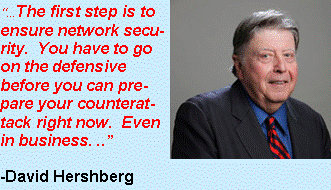Back and Forth with Globecomm CEO David Hershberg and former Navy SEALS Team Six commander and founder Richard Marcinko
by Lou Zacharilla
The “digital revolution” has brought home a reminder that what defends can also attack. Recently we have become aware of the importance of cyber defense, big data mining and their overall impact on privacy and the evolution (or not) of a free society. Increasingly, many of us feel vulnerable and exposed. The first reaction has been rage and concern. The Prism revelations in the USA and cyber kinetic attacks, most notably on Iran’s nuclear weapons program, have given societies served by satellite a sharp pause. Strategies for managing threats have been altered to accommodate the new reality of virtual battlefields. The impact of drone strikes, as well as the ongoing threat that a rogue nation or group of malicious hackers can effectively bring to freeze” the economy of a free society, or worse, is the real “new normal.”
Satellites, as you would expect, are running in the background for all of this, but perhaps less quietly than ever before. During the week O3b was preparing its historic launch, and our understanding of Earth’s future climate were advanced as the biomass of the northern hemisphere’s forests was mapped with greater precision than ever before by satellites, I was caught off guard by a reporter’s response to the word “satellite.” While in Canada giving a speech, I mentioned to a group of reporters that I believe satellites will contribute more to the future of the world’s economy, its cities, towns and industries, than any other technology over the next 20 years. I got a reply from a reporter that I had never before encountered. To put it in a few words he said, “Satellites? You mean satellites that listen to our phone calls and blow people up?”
I spent the next 15 minutes going over the virtue of satellites. But there it was - a misperception based on a lack of understanding of the complete picture. But perception is reality and it is up to us in the industry to be the ambassadors for the technology we love. It also helps if we tell it like it is about the dangers in the world, and how thin the line can be between our comfortable lives, and legitimate threats to it.
To help me, I reached out to people in our industry to get their take on this issue. Not surprisingly few were willing to go on record because the issue is so new and sensitive. However two people, Globecomm’s CEO David Hershberg and former Navy SEALS Team Six commander and founder, Richard Marcinko, were willing to discuss the issue openly.
Hershberg is an inductee in the Satellite Industry Hall of Fame and Dick Marcinko a best-selling author. One is an innovator who has launched a new service to provide cyber protection and the other a controversial observer of the shadow worlds of government. Excerpts of our ‘Back and Forth’ exchange follows:
Lou Zacharilla (LZ): We have all become aware of the importance of cyber defense and its impact on national security. Cyber kinetics blew-up Iranian progress on its nuclear program and we have seen sabotage impact the economies of Korea and others. We’re all new to this game. What is your reaction to these episodes, as well as PRISM and the reports cyber corporate espionage from places like China?
 Richard Marcinko: My reaction is that, in the case of the West and free nations, we are certainly behind the power curve on cyber warfare, especially involving our global strategic relationship with the Chinese government.
Richard Marcinko: My reaction is that, in the case of the West and free nations, we are certainly behind the power curve on cyber warfare, especially involving our global strategic relationship with the Chinese government.
LZ: Yes. The meeting between the leaders of America and China two weeks ago to discuss cyber issues was made very prominent by the media. It seemed like a big deal.
Marcinko: For good reason. They (China) have military units working against the interests of western culture. This includes their academic and “private” sector, or industry. It is government-controlled. The sheer numbers are mind boggling. Our industries and response are fragmented and we are late to the party. It is essential that we cultivate our future leaders, in the satellite industry and other parts of society, to understand this.
LZ: David, as an entrepreneur, what can we do as an interim step to understand the issue better and to even turn it into an opportunity?
David Hershberg: The first step is to ensure network security. You have to go on the defensive before you can prepare your counterattack right now. Even in business. As we have seen, and as Commander Marcinko said, there will be more coordinated attacks on the one area where the most damage can be done: the innovative economies of the world. So we went to skunk works mode and developed a new brand called Cytelics. Simply stated we need a comprehensive security approach and ways to coordinate programs and technologies that can be applied in all areas that are vulnerable. Cyber attack is costly. The only sure way of providing security is to supply a network that is independent of the public network.
LZ: Can satellites play a role here?
 Hershberg: Sure. Satellite communications can be the solution. By providing a completely private network to provide critical infrastructure and process controls, we can be more certain of the security of the systems. Networks using encrypted VSATs that are deployed in the spot Ka-band beams of the Jupiter and ViaSat satellites offer a quick and economic solution. There are also practical issues we need to beef-up. For example, facilities must be physically and electronically secured, and only cleared personnel must be allowed to operate and maintain the networks. Free people are often not as good in the first phase of a change, or an aggressive attack, in this area. But we need to respond and we think we have a new and innovative solution with Cytelics. It is a start.
Hershberg: Sure. Satellite communications can be the solution. By providing a completely private network to provide critical infrastructure and process controls, we can be more certain of the security of the systems. Networks using encrypted VSATs that are deployed in the spot Ka-band beams of the Jupiter and ViaSat satellites offer a quick and economic solution. There are also practical issues we need to beef-up. For example, facilities must be physically and electronically secured, and only cleared personnel must be allowed to operate and maintain the networks. Free people are often not as good in the first phase of a change, or an aggressive attack, in this area. But we need to respond and we think we have a new and innovative solution with Cytelics. It is a start.
LZ: Do we get behind because freedom is not based on paranoia?
Hershberg: Pretty much, yes. But we are vulnerable and need to accept that. It’s a pretty fine line.
Marcinko: The public needs do be more engaged here to see what is really going on. Right now it has its head in the sand and, as we see with the Snowden case, does not want to have the hard discussion yet. We also need to understand what satellites can do here. The industry is limited only by its own imagination. It has served the common interest well and has even greater potential. I think with a military mentality and so I would offer that transmission of "misinformation" can be utilized better. The role in creating the “Arab Spring” needs to be magnified, for example. Let’s think of ways to design options of fragmentation once in orbit; reconstituting automatically once defeated. R&D needs to applied to further investigation into applications that would be feasible with new technologies and designed into the systems at the design phase, rather than at the adaptive phase.
LZ: I hear you both saying, however, that it can be done by ensuring a commercial approach for industry and bringing to bear more upfront planning, innovation and academic research.
Hershberg: Yes. Also we need to consider better ways to protect industrial automation networks that rely increasingly on the cloud and collaboration. We have a service for this now. You have to understand that even in the commercial area, our strengths become weaknesses to our enemies. That is how conflict and war work.
Marcinko: Right. If I can jump in here, I want to say that it is not in anyone’s best interest at this time to harness the technological advancements of what is yet to come for the purpose of some type of Cyber Geneva Convention. Not yet. That means we need to be careful about how we negotiate a “cyber peace.” I honestly would not trust any signatories to fully honor any agreement. I'm certain there would be legal and moral loopholes that would be ignored. We are way early in the game.
Hershberg: Services like the one described are the first step in working toward that. When everyone agrees because they all understand that they cannot win without agreement, you will see a treaty or whatever comes next. The field is open for innovation and the stakes for our industry are high.
------------------------------------
 Lou Zacharilla is the Director of Development of the Society of Satellite Professionals International (SSPI). He can be reached at: LZacharilla@sspi.org
Lou Zacharilla is the Director of Development of the Society of Satellite Professionals International (SSPI). He can be reached at: LZacharilla@sspi.org





